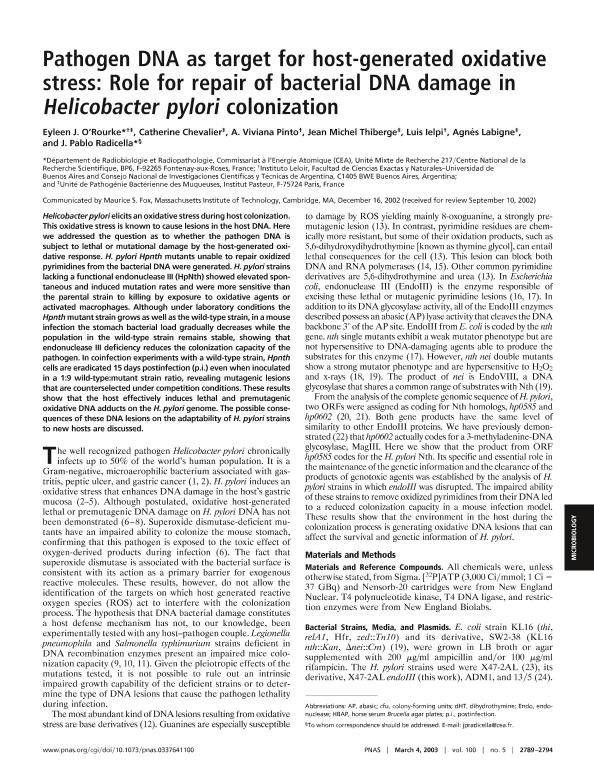Mostrar el registro sencillo del ítem
dc.contributor.author
O'Rourke, Eyleen J.
dc.contributor.author
Chevalier, Catherine
dc.contributor.author
Pinto, A. Viviana
dc.contributor.author
Thiberge, Jean Michel
dc.contributor.author
Ielpi, Luis

dc.contributor.author
Labigne, Agnes
dc.contributor.author
Radicella, Juan Pablo
dc.date.available
2018-05-15T18:16:49Z
dc.date.issued
2003-02
dc.identifier.citation
O'Rourke, Eyleen J.; Chevalier, Catherine; Pinto, A. Viviana; Thiberge, Jean Michel; Ielpi, Luis; et al.; Pathogen DNA as target for host-generated oxidative stress: Role for repair of bacterial DNA damage in Helicobacter pylori colonization; National Academy of Sciences; Proceedings of the National Academy of Sciences of The United States of America; 100; 5; 2-2003; 2789-2794
dc.identifier.issn
0027-8424
dc.identifier.uri
http://hdl.handle.net/11336/45217
dc.description.abstract
Helicobacter pylori elicits an oxidative stress during host colonization. This oxidative stress is known to cause lesions in the host DNA. Here we addressed the question as to whether the pathogen DNA is subject to lethal or mutational damage by the host-generated oxidative response. H. pylori Hpnth mutants unable to repair oxidized pyrimidines from the bacterial DNA were generated. H. pylori strains lacking a functional endonuclease III (HpNth) showed elevated spontaneous and induced mutation rates and were more sensitive than the parental strain to killing by exposure to oxidative agents or activated macrophages. Although under laboratory conditions the Hpnth mutant strain grows as well as the wild-type strain, in a mouse infection the stomach bacterial load gradually decreases while the population in the wild-type strain remains stable, showing that endonuclease III deficiency reduces the colonization capacity of the pathogen. In coinfection experiments with a wild-type strain, Hpnth cells are eradicated 15 days postinfection (p.i.) even when inoculated in a 1:9 wild-type:mutant strain ratio, revealing mutagenic lesions that are counterselected under competition conditions. These results show that the host effectively induces lethal and premutagenic oxidative DNA adducts on the H. pylori genome. The possible consequences of these DNA lesions on the adaptability of H. pylori strains to new hosts are discussed.
dc.format
application/pdf
dc.language.iso
eng
dc.publisher
National Academy of Sciences

dc.rights
info:eu-repo/semantics/openAccess
dc.rights.uri
https://creativecommons.org/licenses/by-nc-sa/2.5/ar/
dc.subject
Helicobacter Pylori
dc.subject
Dna Damage
dc.subject.classification
Otras Ciencias Biológicas

dc.subject.classification
Ciencias Biológicas

dc.subject.classification
CIENCIAS NATURALES Y EXACTAS

dc.title
Pathogen DNA as target for host-generated oxidative stress: Role for repair of bacterial DNA damage in Helicobacter pylori colonization
dc.type
info:eu-repo/semantics/article
dc.type
info:ar-repo/semantics/artículo
dc.type
info:eu-repo/semantics/publishedVersion
dc.date.updated
2018-05-10T15:45:28Z
dc.identifier.eissn
1091-6490
dc.journal.volume
100
dc.journal.number
5
dc.journal.pagination
2789-2794
dc.journal.pais
Estados Unidos

dc.journal.ciudad
Washington
dc.description.fil
Fil: O'Rourke, Eyleen J.. Centre National de la Recherche Scientifique; Francia. Instituto Pasteur; Francia
dc.description.fil
Fil: Chevalier, Catherine. Instituto Pasteur; Francia
dc.description.fil
Fil: Pinto, A. Viviana. Consejo Nacional de Investigaciones Científicas y Técnicas. Oficina de Coordinación Administrativa Parque Centenario. Instituto de Investigaciones Bioquímicas de Buenos Aires. Fundación Instituto Leloir. Instituto de Investigaciones Bioquímicas de Buenos Aires; Argentina. Consejo Nacional de Investigaciones Científicas y Técnicas. Oficina de Coordinación Administrativa Ciudad Universitaria. Instituto de Química Biológica de la Facultad de Ciencias Exactas y Naturales. Universidad de Buenos Aires. Facultad de Ciencias Exactas y Naturales. Instituto de Química Biológica de la Facultad de Ciencias Exactas y Naturales; Argentina
dc.description.fil
Fil: Thiberge, Jean Michel. Instituto Pasteur; Francia
dc.description.fil
Fil: Ielpi, Luis. Consejo Nacional de Investigaciones Científicas y Técnicas. Oficina de Coordinación Administrativa Ciudad Universitaria. Instituto de Química Biológica de la Facultad de Ciencias Exactas y Naturales. Universidad de Buenos Aires. Facultad de Ciencias Exactas y Naturales. Instituto de Química Biológica de la Facultad de Ciencias Exactas y Naturales; Argentina. Consejo Nacional de Investigaciones Científicas y Técnicas. Oficina de Coordinación Administrativa Parque Centenario. Instituto de Investigaciones Bioquímicas de Buenos Aires. Fundación Instituto Leloir. Instituto de Investigaciones Bioquímicas de Buenos Aires; Argentina
dc.description.fil
Fil: Labigne, Agnes. Instituto Pasteur; Francia
dc.description.fil
Fil: Radicella, Juan Pablo. Centre National de la Recherche Scientifique; Francia
dc.journal.title
Proceedings of the National Academy of Sciences of The United States of America

dc.relation.alternativeid
info:eu-repo/semantics/altIdentifier/url/http://www.pnas.org/content/100/5/2789.long
dc.relation.alternativeid
info:eu-repo/semantics/altIdentifier/doi/https://doi.org/10.1073/pnas.0337641100
Archivos asociados
